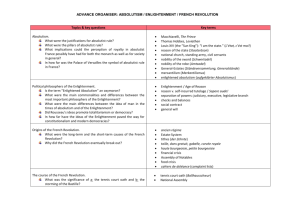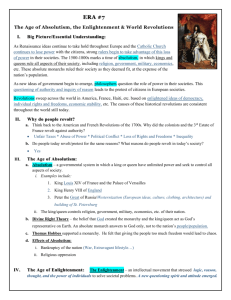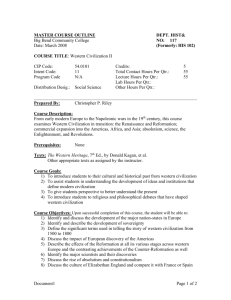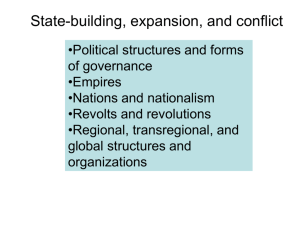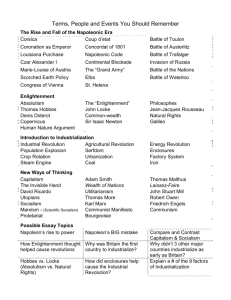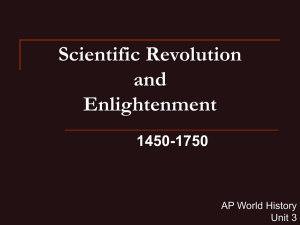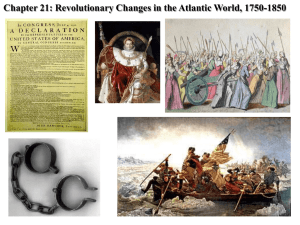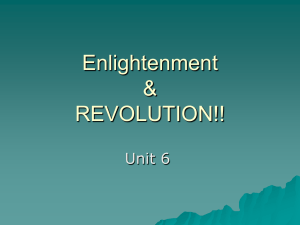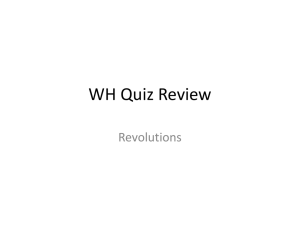AP EURO FINAL STUDY GUIDE Use this study guide to help you
advertisement
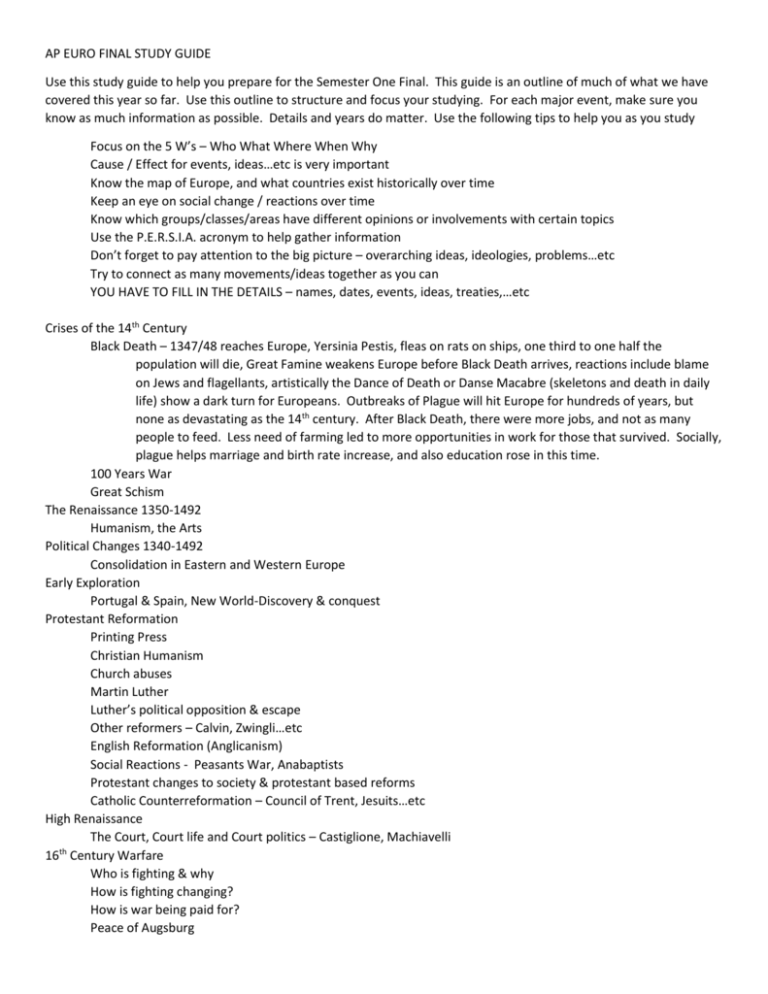
AP EURO FINAL STUDY GUIDE Use this study guide to help you prepare for the Semester One Final. This guide is an outline of much of what we have covered this year so far. Use this outline to structure and focus your studying. For each major event, make sure you know as much information as possible. Details and years do matter. Use the following tips to help you as you study Focus on the 5 W’s – Who What Where When Why Cause / Effect for events, ideas…etc is very important Know the map of Europe, and what countries exist historically over time Keep an eye on social change / reactions over time Know which groups/classes/areas have different opinions or involvements with certain topics Use the P.E.R.S.I.A. acronym to help gather information Don’t forget to pay attention to the big picture – overarching ideas, ideologies, problems…etc Try to connect as many movements/ideas together as you can YOU HAVE TO FILL IN THE DETAILS – names, dates, events, ideas, treaties,…etc Crises of the 14th Century Black Death – 1347/48 reaches Europe, Yersinia Pestis, fleas on rats on ships, one third to one half the population will die, Great Famine weakens Europe before Black Death arrives, reactions include blame on Jews and flagellants, artistically the Dance of Death or Danse Macabre (skeletons and death in daily life) show a dark turn for Europeans. Outbreaks of Plague will hit Europe for hundreds of years, but none as devastating as the 14th century. After Black Death, there were more jobs, and not as many people to feed. Less need of farming led to more opportunities in work for those that survived. Socially, plague helps marriage and birth rate increase, and also education rose in this time. 100 Years War Great Schism The Renaissance 1350-1492 Humanism, the Arts Political Changes 1340-1492 Consolidation in Eastern and Western Europe Early Exploration Portugal & Spain, New World-Discovery & conquest Protestant Reformation Printing Press Christian Humanism Church abuses Martin Luther Luther’s political opposition & escape Other reformers – Calvin, Zwingli…etc English Reformation (Anglicanism) Social Reactions - Peasants War, Anabaptists Protestant changes to society & protestant based reforms Catholic Counterreformation – Council of Trent, Jesuits…etc High Renaissance The Court, Court life and Court politics – Castiglione, Machiavelli th 16 Century Warfare Who is fighting & why How is fighting changing? How is war being paid for? Peace of Augsburg Religious Wars 1560-1618 French Wars of Religion – St Bartholomew’s Day Massacre, Edict of Nantes, Politiques… Spain’s decline England, Elizabeth I, Spanish Armada 30 Year’s War Causes and course of the war Who was involved Peace of Westphalia Who gained most? Who lost most? th 17 Century Economic crisis Recession of early 1600’s Consequences of recession – famine, disease Impact on peasants, the family Arts & World Views during the “Age of Crisis” Secularization Arts – Theater, Mannerism, Baroque Natural Law & curiosities about life Scientific Revolution Astronomy & the Astronomers – their discoveries Theories/changes and reactions (positive and negative) Tycho Brahe’s Moose (*not really) The scientific method Witchcraft and Witch trials State Building – The age of Absolutism French Absolutism How power is created & maintained Beaucracy, military, dealing with the nobility Building projects, religion Mercantilism Absolutism in Central & Eastern Europe What form does each countries absolutism take? How does it differ from France? Don’t forget the Ottoman Turks Constitutionalism (NOT ABSOLUTISM) English Civil War Leaders, people, and groups involved (and what each wants) Causes, course of war, and consequences Cromwell Role of religion in politics Glorious Revolution of 1688 English Civil War’s impact on political thought Social Contract Theory – John Locke, Thomas Hobbes Dutch Constitutionalism Constitutionalism in English Colonies The Search for Order The Arts – Milton, Baroque, Classicism Women’s roles Religion – fighting paganism How to handle / deal with the poor The Atlantic System 1690 – 1740 Plantations / impact of slavery on New World, Africa, and Europe Justification of slavery Settlement of the Americas Rise of piracy as a result of increased world trade (thanks Mercantilism) What European countries have colonies, and where? Consumerism beginning Changes in consumption by Europeans Changes in Society (Early 18th Century) Agricultural Revolution – causes, where, and its impacts The Arts – Rococo, Music for the public, literacy increasing, and novels Religious revivals State Consolidation in the 18th Century War of the Spanish Succession 1701 – 1713 Life after Louis XIV Power shifts – GB rise, Dutch eclipse England’s Constitutionalism continues – Hanoverian take over, creation of Prime Minister Russia Under Peter the Great Peter’s brand of absolutism Westernizations Power balance shifts in Eastern Europe Early Enlightenment Thought Why do people have more time to think Impact of scientific revolution on people’s minds/thought Skepticism Travel literature The Enlightenment Philosophes and the ideas of each Key ideas and principles of the Enlightenment What inspires / helps Enlightenment thought Effects on Religion Effects and pressure on the State Effects on Society – who adopts E thought, who dislikes it, how does society adapt to age of E Popular culture during the age of Enlightenment Enlightened Despots and their reforms Power conflicts during the Era of Enlightenment War of Austrian Succession Seven Year’s War First Partition of Poland Rebellions / Resistance mid 18th century General causes & role of E thought Pugachev Rebellion Wilkes Affair Gordon Riots American Revolution – E influence on it, and how it influences others How will Enlightenment influence future rebellions Revolutions in the low countries (late 1700’s) Influences and outcomes French Revolution France pre –revolution – Enlightenment Ideas, society & 3 estates, financial crisis, food shortage Rulers and their weaknesses Timeline of key events of the Revolution (causes and outcome of each) Key people & groups and what ideas and desires each had Major ideas Phases of Revolution Revolutions impacts – government, politics, society, religion, other countries… Spread of Revolutionary ideas – impact on Poland and French colonies in Caribbean Napoleon’s Rise to power During French Revolution Coup d’etat and eventual emperorship Emperor Napoleon’s Rule How he ran his government New social hierarchy Expanding the empire Napoleon’s Civil Code What it entailed How was it revolutionary? Conservative? Paternalism The Army and Napoleon’s Conquests How was army run / created Major battles 1800-1815 Territories gained, and how map of Europe was redrawn How new territories were governed Continental System – what was it, why was it created, and why did it fail Resistance to Napoleon’s rule and empire Napoleon’s Downfall Spanish War for independence Invasion of Russia Abdication / Elba / The Hundred Days Waterloo St Helena Restoration of Louis XVIII The Restoration of Europe Congress of Vienna 1815 – key people, their ideas, and reactions to FR and NAP Conservatism – why so influential now What is being restored and why? Religion’s come back Romanticism challenges Conservatism Main ideas, people, styles, and what they concentrate on Romanticism and Nationalism Trouble in the 1820’s and 1830’s Political revolts and resistance to conservatism Uprisings/revolts – what caused them and what was the outcome Spain, Italy, Greece, Russia, Latin America Revolution in France 1830 Reform Bill of 1832 in Great Britain Industrialization Early causes People, inventions, resources Why Britain first Impact of railroads / factories Impact on people Work conditions, pay, city life, environment New working class Bourgeoisie vs Proletariat Urbanization Causes, consequences for social and daily life Impact on agriculture and production of food The Social Question and responses to it Reforms – political, social, religious Women and domesticity Imperialism V Colonialism Impacts of Industrialization and Urbanization on society Changing social order Class struggles What role should the government have New Ideologies ( and existing ones) What is each idea? Who tends to follow the idea? What brought it about? What will it change? How do we see examples of these ideas carried out? Liberalism vs Conservatism Nationalism Socialism Communism Chartism Revolutions of 1848 Hungry 40’s Where are these revolutions taking place What is causing them to occur Who is involved and what do they want What are the outcomes You can use the following chart if you like to help you reorganize information century by century. ________th Century – don’t just list – describe, explain, analyze, and connect as much as you can! People Politics Events Economics Religion Social / Society Imperial (only in 19th Century) Pre 19th century, do COLONIAL Industiral (only in 19th century) Agricultural Artistic What big ideas and trends are in this century? Who is powerful? Who is weak? What is society / daily life like? For poor, middle and upper classes? What is influencing events in this century from before? What events/people will influence future events, and how?
